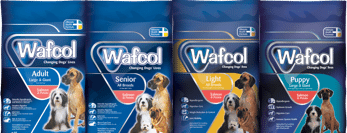Whether the term ‘dietary sensitivity’ is new to you or your dog has always suffered from sensitivities relating to their food, you may wonder what this term actually means for you, and of course for your dog.
Your pet may suffer from upset stomachs, colitis or even skin allergies which can all be caused by certain ingredients featuring in many foods available in the dog food market. This is all part of your dogs’ dietary sensitivity. Once the sensitivity has been identified you are able to change your dogs’ diet, therefore hopefully eliminating their symptoms relating to specific sensitivities.
But firstly, what is dietary sensitivity? It is a common phrase covering any adverse reaction to food. Within this, there are two main types of sensitivity, a food allergy and a food intolerance.
Dietary Sensitivity:
Food Allergy – A food allergy will result in an immune response to a particular ingredient in the diet. This can be any food product that the dog is consuming but, in most cases, it is usually in response to a protein in the product. Once the ingredient that causes the reaction has been identified it will need to be excluded from your dogs’ diet for life.
Food Intolerance – A food intolerance is where the reaction to a particular ingredient does not cause an allergic reaction but where an ingredient cannot be tolerated. In some cases, dogs may be able to eat the ingredient in small quantities, however, there is no way of knowing what level a reaction will be triggered, it is prudent to avoid the ingredient once identified.
Both of these reactions can cause similar reactions from your dog, so you may need to seek veterinary advice to really figure out what is causing these negative symptoms for your furry friend. Read more about symptoms of sensitives in our article “Is My Dog Sensitive?”.
This naturally leads to the next question – what causes these dietary sensitivities? There are many causes of dietary sensitivity that can work individually or accumulate, working together to cause your dog health problems.
An illness that affects the digestive system has the ability to lead to dietary sensitivities. In addition, some breeds are more susceptible to problems than others. Gluten intolerance is more prevalent in Golden Retrievers and Irish & English Setters. Also, other breeds that tend to have more than their fair share of dietary intolerances include the Labrador Retriever, German Shepherd, West Highland White Terrier and Schnauzer – to name just a few.
Whilst the age of your dog is not strictly a cause of sensitivity, it may help differentiate whether your dog has a food allergy or intolerance. Food allergies are more likely to affect adult dogs whereas food intolerances are more common in young dogs.
The most common cause of dietary sensitivity is food products and the ingredients contained within them. Wheat, dairy and beef products are all amongst the largest ingredient offenders that can cause health problems as well as other meat and cereal products.
The most effective way to identify and help your dogs’ dietary sensitivity is to introduce an exclusion diet. This would usually be a ‘hypoallergenic’ food that excludes those nasty allergens that cause an allergic response from your dog which is the first step in identifying your dogs’ trigger.
The Wafcol sensitive range is a hypoallergenic diet that is formulated to be gentle on sensitive digestive systems using a single source of protein. Not only this, it is also grain free, has no cereals and generally no nasties that are known to trigger food allergies or intolerances for your dog.
Take a look at our Success Stories to discover our Wafcol heroes and learn a little more about how Wafcol has changed their lives.

